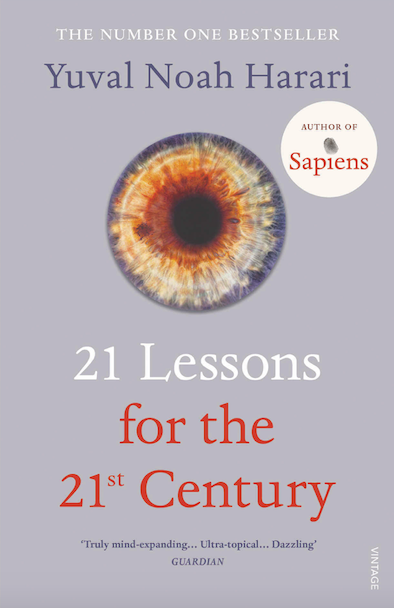Yuval Noah Harari’s latest tome is a masterly exploration of the modern condition, writes Perry Timms
Eulogized by President Obama and Bill Gates, Yuval Noah Harari’s Sapiens (2011) was a powerful reminder of our humanity, while also being a book about technology – or, technologies. It wasn’t just about today’s digital conundrums, but about all the technologies that human beings have introduced to the world to improve their lives, spanning from ancient agriculture – who knew that wheat could be considered a technology? – to the modern day. Harari followed up with Homo Deus (2015), where he considered the possibility of a new breed of human: a digitally-fused entity, which would herald a colossal range of changes and dangers.
If Sapiens was about the past and Homo Deus about our (possible) future, 21 Lessons for the 21st Century is a book about now. It is a rollercoaster philosophical review of where we find ourselves today.
Harari has a habit of giving the reader two things. They are, firstly, the ‘oh my’ moments: a reaction to the troubles and challenges that Harari explores. These are the moments of realization, of understanding that things are as they are for a reason – a reason which may not be immediately evident, yet which Harari makes crystal clear. In the second category are the ‘oh yes’ moments: reactions to the ideas and questions that Harari weaves into his writing. They often represent things you are already thinking about, have distilled into your own reasoning, or have deduced based on your own theories of how things are, but to which Harari invariably brings new clarity.
21 Lessons is packed with these moments, and readers of his earlier work will not be surprised to find that they make the new book completely compelling. Harari really is a ‘listenable’ soul.
Harari doesn’t have all the answers to the questions and challenges he identifies. Like many philosophers, his role is to be the sage, not the prescriber of solutions. He’s the provocateur, not the realist plan-maker; the stimulator, not the product creator.
What 21 Lessons does instead is set out a series of socio-political, socio-economic, and socio-anthropological issues that we need to examine – if nothing else, to help make sense of the turbulence in the world. Starting with ‘disillusionment’, Harari looks at why liberal democracy is floundering, tracing its problems back to the 2008 global economic crisis. People are disillusioned with unfulfilled promises, false dawns and self-serving agendas from political figures and parties. It is a fairly gloomy opening, but readers should not be put off; not least because it moves swiftly into one of my favourite topics, ‘work’.
Work was covered in both Sapiens and Homo Deus and, admirably, Harari avoids too much replication – something which can’t be said of all authors. While some commentators now talk down the AI revolution in work, Harari sees revolutionary potential, but he emphasizes the importance of the human dimension. One terrific example comes from drones used by the military. At first glance, technology is set to replace the human pilot of a reconnaissance plane, and perhaps the crew that serviced the plane. In fact, that small team is likely to be replaced by perhaps 30 people: a drone pilot and a new service team, yes, but also analysts, data scientists, cultural anthropologists, and behavioural economists.
So will AI destroy jobs and leave us a job-less, law-less ‘civilization’? It’s not what Harari thinks, although he does expect that change will be significant because of the nature of the new roles created. In the past, agriculture became factory work, which became retail and service support. That’s not the case with AI: it will take out all low-cognition repetitive work, and even high-cognition repetitive work, leaving many of us needing to ‘upskill’ to fulfil higher cognitive or creative roles.
The remaining 19 lessons are wide ranging. AI reappears under ‘liberty’, where Harari considers its huge role in surveillance. The egalitarian warrior in me cheered during the chapter on ‘equality’, because – much like Dutch author Rutger Bregman, who shot to fame off the back of comments on inequality at the 2019 Davos summit – Harari calls out injustices clearly, although I was left frowning at the prospect of greater inequality. ‘Community’ looks at why loneliness and isolation are rising when we are more connected than ever before; ‘civilization’ brings Harari’s most ideological moments, with a vision of humanity being brought together in some form of global consortium.
Harari then moves onto the dangerous grounds of religion, nationalism, immigration, terrorism, war, god, and secularism – sections which bring some very stark realizations. He is as gentle as he can be, but there is no doubting that humanity finds itself in a perilously divided state of affairs.
Later sections on humility, justice, education, science fiction and ignorance get to the heart of what we believe and how our beliefs are threatened and challenged daily by our own actions. In the ‘post truth’ chapter, he notes that today’s information wars are really nothing new: we’ve had propaganda and lies forever.
He ends with sections on ‘meaning’ and ‘meditation’, more optimistic chapters that set out why it so important that we all derive a ‘north star’ to steer by in our own lives. After the preceding 19 lessons, it is easy to see how we get knocked off track. This reviewer’s takeaway? Find meaning in serving others and through acts of kindness and love; and live in reality, not within a story or a fantasy.
21 Lessons for the 21st Century is an absorbing, realistic, stark, yet hopeful book. With many of us struggling to make sense of our Facebook feeds, Twitter timelines or even of the familiar TV channels we once thought would help us understand the world, we need people like Harari to help us learn: about ourselves, about each other, and about how we might come up with rescue plans for our troubled world.

— 21 Lessons for the 21st Century, Yuval Noah Harari, Spiegel & Grau (USA), Jonathan Cape (UK)
— Perry Timms is an independent HR/OD practitioner, speaker, writer and CIPD adviser on social media and engagement

